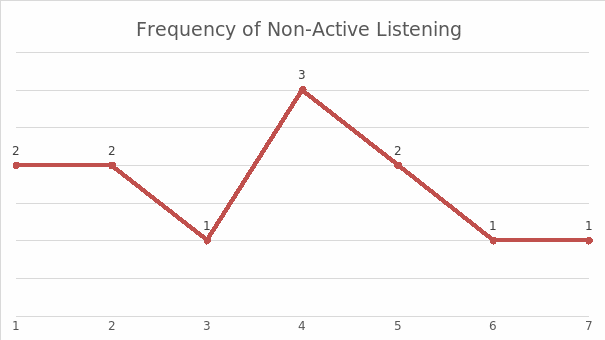Target Behavior
As Arnold and Boggs (2019) defined it, active listening involves an intentional focus on the listening process stretching beyond hearing the interlocutor’s words. It is manifested in empathetic, supportive listening and asking open-ended questions to understand the interlocutor better. An outcome of active listening is a well-informed response and feedback on the provided information, which is more than a simple acknowledgement of the received information.
Observation Period
The observation took one week, from April 4, 2022, to April 10, 2022.

Experiment Narrative
The observation occurred in the participant’s natural work settings during their interaction with colleagues and subordinates. The observation was unstructured, retrospectively focusing on the natural encounters of the participant with colleagues that involved extensive dialogues on any topic. The recording method used for measuring the target behavior was a retrospective self-reflection journal, filled out at the end of every working day. The journal entries covered all encounters between the participant and their interlocutors, with the participant’s self-evaluation of active listening mastery expressed during those communicative intercourses.
Dimensions
The dimensions of interest included the duration of each dialogue between the respondent and their interlocutors and the number of interruptions the participant made. The checklist for every interaction ranked the respondent’s quality of active listening, depth of insight into the interlocutor’s perspective, and empathy with a 5-point Likert scale. A score of “1” on the scale meant little insight, and a score of “5” meant much insight.
Target Behavior Observations
The one-week observation of active listening revealed that the respondent could become more actively listening when they had enough time for the communicative act and were not in a hurry. Everyday haste in the workplace is not conducive to active listening, as everyone tries to get the core needed information without giving enough attention to communication overall. Besides, the observation revealed that the respondent could engage in active listening once they made a conscious effort to do so in a communicative act. This outcome suggests that active listening is an acquired skill that can be purposedly trained within the communicative context.
References
Arnold, E. C., & Boggs, K. U. (2019). Interpersonal relationships: Professional communication skills for nurses. Elsevier Health Sciences.
